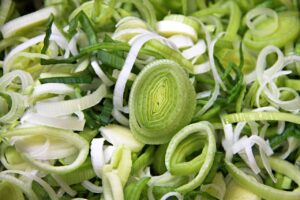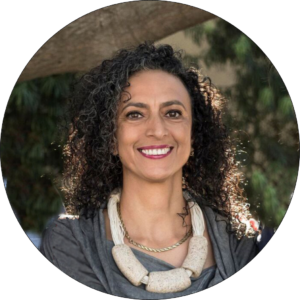
Photo: Yemenite Family having a Rosh Hashanah Seder
Courtesy of Zoltan Kluger
There are three Seder ceremonies during the year.
One that I knew about, one that I celebrated and didn’t know I actually did, and one I learned as an adult.
Passover Seder is the one we all celebrate, Tu B’shavat seder (Birthday of the trees), and Rosh Hashanah. That was the one I discovered and celebrated, but never knew it was actually a Seder.
Since we are gearing towards the High Holidays I’ll share the latter.
If you are like me growing up celebrating Passover Seder wasn’t the most fun ceremony in the world. It took forever just to get to the first blessing to eat a piece of parsley… “yoo hoo”, how exciting. Dinner was so far in the future, a dream. We were dreaming of the dinner like slaves who are waiting for their freedom.
But Rosh Hashanah was fun. Short, to the point, round Challah with raisins, yummy fruits and vegetables… yes, vegetables; to some of them we were looking forward to all year.
Rosh Hashanah – is the New Year. When you translate it literally from Hebrew to English it means the Head of the Year (Rosh- head, Shanah –year).
Please, don’t forget about the head, it’s an important part of the ceremony. I’ll come back to it.
On the Eve of Rosh Hashannah, just before sunset when the holiday started my Mom lit the candles, which brought light and warmth to our home.

Photo: Courtesy of Alex Ringer
Shortly after my father’s arrival from the synagogue we started the Seder.
My Dad made the Kiddush over the wine, and then over the Challahs. And that was the moment when the happiness started. Usually my Dad will dip the Challah in salt and then hand us a piece, but Rosh Hashanah was special, this time it was honey. That was the time when carbs and sugar did not count.
Photos: Courtesy of lumix2004 and Przemysław Wierzbowski
It was only when I was in my early 20s that I realized that these blessings weren’t chosen randomly, and had a meaning to them. Some of them I learned and some of them are my personal interpretation.
I find it interesting that all the blessings are actually not blessings. A blessing usually will start with Baruch Ata, which is praise to G-d.
It is actually a request, a wish- “Yehi Ratzon …” May it be the will of G-d.
That’s the reason why they are not called B’rachot (blessings) they are called Simanim (signs).
With my love of letters I looked at the fruits and vegetables and realized there is a straight correlation between the Siman (sign) and the fruit/vegetable.
Since I grew up in a Yemenite home this is the order of our Seder.
We blessed on the Date, Pomegranate, Apple dipped in honey, Pumpkin (K’ra), String Bean (Rubiya), , Leek (Karaat), Beets, and Fish.
These Simanim are said for us as a nation, for our community.
Personally I think each of us can look at their life and apply any of the Simanim to their current life and state of mind.

Photo: Courtesy of Asiabasia
The first Siman is Tamar- Date
The wish is to end all enmity towards us.
I looked at the Hebrew word Tamar and saw not one rather two words in it.
Tam which means – end
The second part of the word is Mar- which means bitter.
So in essence we are asking to end our bitter circumstances.
Only when that happens, happiness will flourish.

Photo: Courtesy of Pixabay
The second Siman is Rimon- Pomegranate.
This is the sweet fruit that has many seeds. The claim was that there are 613 seeds in it, and therefore it’s like all the commandments we are required to keep.
Unfortunately, these days we know that a single pomegranate has between 200-1,000 seeds. However, on average they have about 600. We are close.
The Siman of the Pomegranate is positive. May it be that our rights will increase? I understand it as our as a wish that our righteous actions will be increased or actions will be translated as positive rather negative. We are heading to Yom Kippur – the Day of Atonement.

Photo: Courtesy of Pixabay
Apple (dipped in honey)
Tapua’ach- The apple has so many meanings.
When I look at the root of the word Tapu’aach ת פ ח.
The root means to rise, to swell, just like dough.
There was no place I could make any connection between the root and the apple.
However, we know that the apple is a very special fruit, starting with the tradition that Adam and Eve ate from it, to the claim that an apple a day will keep the doctor away.
But being curious and stubborn I had to find interesting and different fact about the apple.
So I turned to Gematria, where we use the value each word to teach us different facts.
Apple תפוח- the numeric value is 494
ת = 400 פ = 80 ו = 6 ח= 8
What another word or a phrase from the Bible will have the value of 494?
The passage is from Psalms Chapter 136, and you can find it in other places in the book of Psalms.
It is a very famous line that praises G-d for his goodness and mercy.
הללו-יה הוֹדוּ לַיהוָה כִּי-טוֹב: כִּי לְעוֹלָם חַסְדּוֹ
Praise G-d, give thanks unto the L-RD, for He is good, for His mercy endures for ever.
הללו-יה הוֹדוּ לַיהוָה כִּי-טוֹב: כִּי לְעוֹלָם חַסְדּוֹ
78 +176 + 30+17+30+56+21+ 86 = 494
Is there any correlation? You’ll have to decide, but I find it quite interesting.
Let me know if you are interested and I’ll write about this topic.

Photo: Courtesy of Pixabay
D’vash- Honey
There are two kinds of honey. One is produced by bees and the other is honey from dates. In this case the Torah and the blessing refers to date honey.
The funny thing is that while we were growing up we all blessed on the bee’s honey. I don’t think we had really heard of date honey. It became very popular in Israel in the last few decades. It is called Sil’aan.
Eating Tapuach B’dvash, an apple dipped in honey, has many explanations.

Photo: Courtesy of Pixabay
K’raah – from the family of the Pumpkin.
Did you ever eat a large piece of pumpkin after it was boiled, softened and cooled?
It doesn’t sound appetizing. But we all just loved it. Different strokes for different folks.
The Siman is the wish to have the verdict of our sins to be torn up, like a paper is torn up, and our righteous actions will increase.
The root of the word is ק ר ע is a harsh word, it’s to tear apart, to rip.
It’s an act you can not repair. Usually when you rip something apart or tear it, you cannot reassemble it.
That’s how strong the desire to change the decree of our wrong actions is desired, and therefore the right actions will be counted more.
Gezer- carrot is also used since the root of the word is ג ז ר could be translated as to cut (like with scissors) which can relate to the word to tear apart.
However, in this context it means a verdict, and as we know once there’s a verdict against someone there is no change of the faith of that individual or people.
One of the things I will never forget, as won’t my siblings and family friends, was my Dad’s “Hummmmm” with closed lips, as a sign of warning of a big sin we are making. This “Hummmm” meant “I’m blessing”, and when that happens until we say the Amen and tasting the blessed food we must be silent!
We had quite a few “hummm” during the Seder. What can you do with excited children eating favorite foods? To be quite frank, we were never able to be totally quiet which meant the “hummm” never stopped.
How much we miss those days!

Photo: Courtesy of Pixabay
Rubia a long and thin string bean with many small pods.
The root is ר ב א which relates to the word Harbe – which means plenty.
It is a positive Siman. We wish to have plenty of righteous actions. That a lot of our actions will be favored as the right actions. The more the merrier.

Photo: Courtesy of Manfred Richter
Karat is leek
The root of the word כ ר ת is to cut off, to cut from the root. And the wish is that our enemies will be cut off from our lives. And I do believe that these wishes are not only referring to our enemies as a nation, but also our personal enemies, the thoughts, situations one wishes to cut out of their life.

Photo: Courtesy of Pixabay
Selek- Beet
The root of the word ס ל ק is to get rid of, to expel. And again it is used against our enemies.
If someone will tell you to “L’histalek”,using it as a verb, it’s an extremely offensive way to convey ones feelings. Quite often when you hear people argue and one of them is fed up with the other, one would say “Tistalek/i Li Mehapanim”, which will be translated as “Get out of my face”. But if you think about the meaning of that sentence in Hebrew it is deeper than just get out, it’s your wish to get rid of someone, to expel them from your life.
The good news, we might be angry at that moment, and use this phrase but in all reality not meaning it.

Photo: Courtesy of Pixabay
Dag – Fish
It’s one of my favorite dishes and probably my favorite Siman.
Remember the head I talked about at the beginning? Rosh Hashannah, the Head of the Year.
This is the Siman we wish to be the head rather than the tail.
And for your curiosity, we actually had the head of the fish as part of the ceremony… on the table! It wasn’t bad, even though, there were all the ‘YUCK!’ from the kids and some of the adults too.
The fish is the last Siman.
You’ll notice this is the wish for the future. It’s not about our previous actions, our regrets and wishes for the best. It doesn’t address our enemies.
This Siman is all about the future. We make the decision now how our next year will be. It’s the future where we’ll choose to be “the head“ rather than “the tail”, our choice of becoming leaders rather than followers.
I take it as a personal Siman. To me it’s a great reminder of the inner strength I have to create and pave my way. To have the belief that I can and will achieve the future I want. To have the Rimon (pomegranate) with all its 613 Mitzvot as guidance, that will bring insight to do the right things.
Looking at the whole Seder and its Simanim, the food is yummy and sweet. However, the Seder is not about eating sweet foods only. It is actually a preparation for the Day of Atonement, Yom Kippur.
We wish, we ask, we hope for forgiveness and at the same time we are asking to be rewarded for our positive rewards and to grant us another good year.
There are four positive Simanim and four negative Simanin.
If we add the wine and Challah we have a total of ten – this number is good luck in Judaism.
Shannah Tova U’Metukah

Previous guest posts:
Tallit Expert Sharona Lomberg on The Thread That Connects Us
Tallit Expert Sharona Lomberg on The Difference between Tallitot
Tallit Expert Sharona Lomberg on Yes She Can, No She Can’t
Want to learn more about Sharona and her work? You can find her interview with us here.








